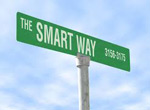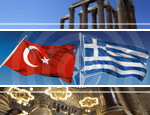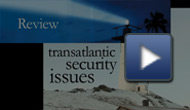Smart Defence: the economic angle
Smart Defence:
The economic angle
In July 2009, as the economic crisis
was unfolding around the world,
we interviewed NATO's Senior
Defence Economist, Adrian Kendry,
to see how he thought the crisis
would affect defence and security.
Three years later we revisit
some of the issues and places
of that original report
and ask Mr. Kendry:
What was the impact
of this economic crisis
on the advent of Smart Defence?
Adrian, we're back here
after three years.
This is where we discussed
the financial crisis in 2009.
A lot's happened
and changed since then,
but the Smart Defence policy
that the Secretary General
is trying to put forward,
is one of those new aspects.
It's claimed that it's not
directly linked to the economy.
How does that work?
I think those people who believe
that there is a difference
between the economic challenges
and the security challenges,
are missing a fundamental point.
They are missing
the fact that economic security
in the years that have followed
since we were last discussing this,
has become a major threat.
The resources available for defence
spending is becoming scarce.
So, the fact that we’ve wasted
millions of euros in recent years
and the way that we have
conducted our defence spending,
that’s got to all come to a stop.
- This isn't just about saving money?
No, I think that fundamentally,
the time has come for us
to recognise that the austerity,
the financial austerity,
makes it absolutely essential
that we have got to spend more...
spend wisely, spend more prudently,
make sure we eliminate waste.
But, we have also got to take
the opportunity to draw together
as a NATO Alliance and, indeed,
within the whole context
of European defence,
if we are to meet the challenges
which are emerging.
I mean, for example, we see recently
that Asian defence spending
is projected in this year
to go above that
of NATO European countries.
This is an attempt also
to work more closely with industry.
We have a still far too unconsolidated
and a far too fragmented
defence industrial base,
which means that we’re
operating very inefficiently.
But it's really critical for
our capabilities and our technologies
that we come together within Europe
and forge much stronger
cooperation between NATO,
the European Union,
the European Defence Agency
and NATO's
Allied Command Transformation.
So Adrian, three years ago
we were filming here outside
what was a thriving Belgian bank,
but that's gone
and it's been replaced by somewhere
that sells healthy snacks.
Is that an allegory for what's been
going on in the last three years?
Well, in the last three years,
we have seen tremendous changes
taking place within the European
financial system and economy.
Some financial institutions
have indeed suffered greatly.
Retail sales are a symbol of what's
happening to the European economy
and at this stage, things are
very fragile. They remain very weak
and it's probable
that for the next couple of years,
that they will stay in the doldrums.
In fact, the European economy
has not really recovered,
in terms of its total output,
from what it had before 2008.
Although this Smart Defence
looks largely at Europe,
the US has also had its own review.
The link in the transatlantic economy,
this is the most vital economic
relationship still in the world
and it's fundamental that it should
remain healthy and strong.
At this time,
the United States is also vulnerable
to further financial
instabilities in Europe.
If a number of the countries
should experience further difficulties
and we see
more banking losses, more bailouts,
then this could be difficult for the US.
If Europe gets a bad cold now,
then this will certainly cause
the United States to start sneezing.
So Adrian,
this is more a reflection of 2012.
We're in front
of a low budget supermarket
and more and more people
are shopping at this kind of place,
because of the economic
constraints of the time.
How does this impact
on the environment
in which Smart Defence
is being set up?
Everybody is affected
by the economic downturn.
People have to be more cautious,
and spend themselves more smartly.
And Smart Defence is
all about making certain
that we use the budgets
which are available.
And, in my view,
these budgets are likely to fall
in the coming five to eight years.
It is going to become more difficult
because governments
will have to meet
other priorities
in their budgetary spending:
health, education, social security,
pensions, this kind of thing.
So, if we're going to spend
more wisely on defence,
then we have to be sure that we have
a proper basis for cooperating.
I think, this time it's going to work
because I don't think we have
been in this situation before.
Not since the beginning of NATO
and during the Cold War period.
What is the biggest obstacle
to make it work?
The biggest danger
if we get it wrong, in my view,
is that it will lead to fragmentation,
to division across the Atlantic.
We may see our most important
member state, the United States,
pursuing increasingly
its own approach, its own agenda,
and maybe developing
bilateral security agreements
with other member states
across the world.
It could then seriously undermine
the effectiveness
and the cohesion of NATO.






















